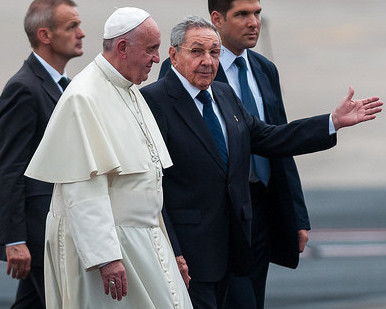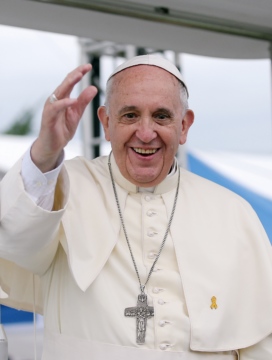Last Sunday the Damas de Blanco -- dressed in white with coral gladioli in their hands -- resumed their customary walk after Mass at the Church of Santa Rita. Freedom again rang along the stately Fifth Avenue in Miramar, a Havana suburb.
For three weeks, government mobs had prevented the ladies from walking in honor of their husbands, sons and brothers imprisoned for their beliefs since the Black Spring of 2003. The ladies had walked every day for a week to mark its seventh anniversary. The regime fumed and told them to apply for a permit; the ladies refused.
Jaime Ortega Alamino, Cuba's cardinal, mediated the crisis and, for once, the government responded. Images of security agents dragging the women into buses after seven hours of insults didn't do official Cuba any favors.
After celebrating Mass at Santa Rita, Ortega addressed the international media. "High-ranking officials offered their guarantees that repression would not be used against the women,'' Ortega said.
The respite, however, is only through May when the government will review the situation. The cardinal might have to make it a habit to officiate Mass in Miramar every Sunday.
A small victory
Still, in the words of leading lady Laura Pollán whose husband is serving a 20-year sentence, it was a small victory. "Love won,'' she added. "If they don't want us to walk anymore, they should set our loved ones free.''
Things haven't been going well for the regime lately. Orlando Zapata Tamayo's death opened the floodgates. The European Parliament, the Mexican government and Senate, Sebastián Piñera, Chile's president, and the opposition Socialist Party, the United States, France, the Brazilian Senate, Amnesty International, the Inter-American Commission on Human Rights -- the list goes on -- asked Cuba to be respectful of life.
The regime was taken by surprise. Should Guillermo Fariñas -- the dissident who launched a hunger strike more than two months ago to protest Zapata's death and demand the release of 26 political prisoners in frail health -- pass away, the ensuing uproar would be deafening.
The Catholic Church, his fellow dissidents and his supporters in Miami are all asking him to desist. Cuba's senior leaders better pray that Fariñas listen.
The cardinal's successful mediation offers a sliver of light. In accepting a compromise regarding the Ladies in White, the government extended a rare hand of moderation --"a good gesture,'' "a novel step,'' said Ortega -- for which it deserves recognition. Many, perhaps most officials in the second and third tiers surely breathed long sighs of relief. There could be a second round.
What's the best option?
Might the 26 political prisoners in frail health ask Fariñas to end his hunger strike? That's what some in Havana and Miami are proposing. The government could invite the Red Cross to visit these prisoners and submit a report on their health.
Or it could ask the cardinal to put together a panel of Catholic physicians to examine them, an even better option. These ailing prisoners must be freed and an intervening professional opinion may be just what Cuba's senior leaders need.
In the end, the government should rethink its policy towards the Damas de Blanco and all other groups in Cuba whose demands fall outside official bounds. All are there for the long haul. Moreover, citizens within the broad fold -- singers Pablo Milanés, Silvio Rodríguez and Carlos Varela come to mind -- are raising their voices to denounce injustice.
"We are thankful for the Church's intervention because we were stubborn -- the government and we -- we (the Damas de Blanco) admit it,'' said Loida Valdés. That's the crux of the matter. When tensions rise, the parties concerned often can't or won't yield. Speaking softly and discreetly is an art that may bring results in these situations.
"In the Catholic Church, the Cuban state has neither an ally nor an enemy,'' said Palabra Nueva, the Havana archdiocese's magazine. To get where we want to go, Cubans of all political leanings -- no matter where we live -- need many more mediators from within our ranks. That's the way forward.

